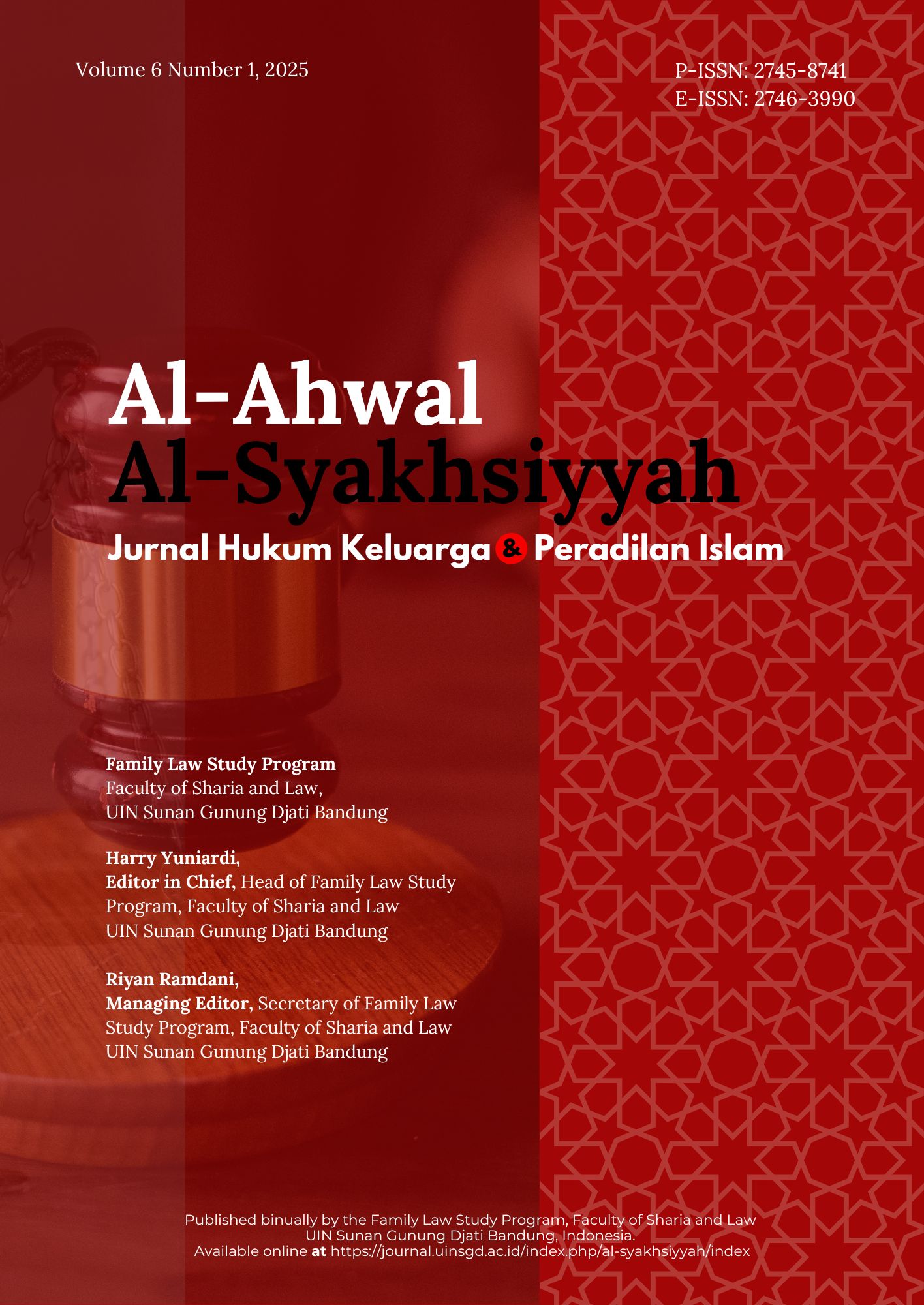Analisis Undang-Undang PKDRT Dalam Relasi Hukum Keluarga Kontemporer Tahir Mahmood
DOI:
https://doi.org/10.15575/as.v6i1.42821Keywords:
PKDRT, Contemporary Family Law, Tahir MahmoodAbstract
This research aims to analyze the law on the elimination of domestic violence (PKDRT) in Tahir Mahmood's contemporary family law relations. Related to the methodology used in this research is normative juridical using qualitative data types of library research and content analysis using a descriptive analysis approach method. The results of the study show that victims of criminal acts of domestic violence are not unwilling to report the crimes of the perpetrators, but there are external forces that prevent them from reporting, one of which is the moral burden on the family and the patriarchal culture is still quite thick. Then law enforcement officials need to provide penalties that provide a deterrent effect to perpetrators of domestic violence in the process of implementing regulations so that the same mistakes are not repeated because if it ends in a peaceful way and is resolved in a family manner, there will be no significant results in providing security to victims because it is not justified regarding the implementation of Law number 23 of 2004 concerning PKDRT. Tahir Mahmood's methodology is one of the steps to reform the PKDRT law because it is in accordance with the situation of maslahat conditions and is relevant to the Indonesian state.
References
Asy-Syathibi, Al-I’tisham, Beirut: Dar al-Ma’rifah, 1982.
Juhaya S. Praja, Teori Hukum dan Aplikasinya. (Bandung: Pustaka Setia, 2011).
Laili, Nur Fauziyah, and Moh. Rofqil Bazikh. “Metode Reformasi Hukum Keluarga Islam Di Dunia Muslim Perspektif Khoiruddin Nasution.†Jurnal Restorasi Hukum 6, no. 1 (2023): 22. https://doi.org/10.14421/jrh.v6i1.3028.
Mahmood, Tahir (1987), Personal Law in Islamic Countries, Academy of Law and Religion, Times Press, New Delhi,1987
Mahmood, Tahir. Family Law Reform In The Muslim World. Bombay: NM. Tripathi PVT LTD, 2010
Mustofa, Imam. “Ijtihad Kontemporer Sebagai Upaya Pembaruan Hukum Keluarga Di Indonesia.†Al-Manahij: Jurnal Kajian Hukum Islam 7, no. 2 (2013): 207–24. https://doi.org/10.24090/mnh.v7i2.565.
Nasution, Khoiruddin. “Metode Pembaruan Hukum Keluarga Islam Kontemporer.†Unisia 30, no. 66 (2007): 329–41. https://doi.org/10.20885/unisia.vol30.iss66.art1.
Rosyaadah, Rifa’, and Rahayu Rahayu. “Protection of Women’s Human Rights Against Cases of Households Violence in Indonesia Based on the Perspective of Intern.†Jurnal HAM 12, no. 2 (2021): 261–72.
SHADIQOH, MILLAH. “Analisis Dampak Pma No.12 Tahun 2016 Tentang Biaya Nikah Gratis (Rp.0) Di Kua Kecamatan Bunut Menurut Hukum Keluarga Islam.†Al-Ahwal Al-Syakhsiyyah: Jurnal Hukum Keluarga Dan Peradilan Islam 3, no. 2 (2022): 117–28. https://doi.org/10.15575/as.v3i2.18759.
Syarif, N, U Saepullah, and A T Fuadah. “Reformasi Dan Transformasi Hukum Keluarga Islam: Model Dan Implementasinya Di Indonesia,†2020. https://digilib.uinsgd.ac.id/31844/.
SIMFONI PPA (Sistem Informasi Online Realtime Perlindungan Perempuan dan Anak)
Tina Marlina, Montisa Mariana, and Irma Maulida. “Sosialisasi Undang-Undang Nomor 23 Tahun 2004 Tentang Penghapusan Kekerasan Dalam Rumah Tangga.†Abdimas Awang Long 5, no. 2 (2022): 67–73. https://doi.org/10.56301/awal.v5i1.442.
Undang-undang No. 23 tahun 2004 tentang Penghapusan Tindak Kekerasan dalam Rumah Tangga
Undang-Undang No. 39 tahun 1999 tentang Hak Asasi Manusia.
Downloads
Published
How to Cite
Issue
Section
Citation Check
License
Copyright (c) 2025 YUSUF HIDAYATULLOH, MOHAMAD SAR'AN, SYAHRUL ANWAR

This work is licensed under a Creative Commons Attribution-NonCommercial-ShareAlike 4.0 International License.





